How to Buy Binance Coin?
Binance Coin (BNB) is the native coin of the Binance Ecosystem as a whole. With a myriad of different use cases, from powering transactions on the Binance Smart Chain, to paying fees on the…
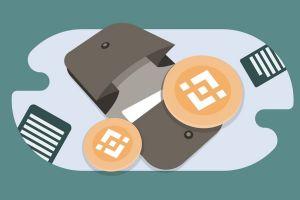
Binance Coin (BNB) is the native coin of the Binance Ecosystem as a whole. With a myriad of different use cases, from powering transactions on the Binance Smart Chain to paying fees on the exchange and in-store payments, its importance grows together with the ecosystem.
The coin was launched in 2017, initially on the Ethereum blockchain as an ERC-20 token before being transferred to the Binance Smart Chain. Although BNB fulfills many uses, it’s main two are on the centralized exchange and the decentralized chain. On the exchange, it serves as a potential way to pay for fees—using BNB gives traders fee discounts to incentivize them to opt for it instead of other options. On the Binance Smart Chain, BNB is used in its consensus algorithm: if you want to become a validator, you will have to stake a certain minimum of BNB. The coin also powers smart contracts as a form of gas.
Nowadays, the coin is the third by market cap, only preceded by Bitcoin (BTC) and Ethereum (ETH). It should come as no surprise, then, that everyone is checking how they can buy some. With such widespread use cases, anyone who is in the crypto industry at all could benefit from owning some BNB.
How to Buy Binance Coin in 2021
So you want to add BNB to your portfolio, but you’re not sure where to start. In this guide, we will take you through five different crypto exchanges that offer BNB-related trading pairs, as well as their pros and cons, so you can be sure you’re making an informed choice.
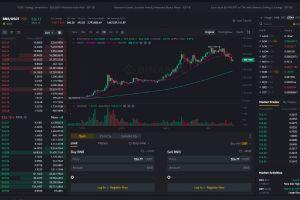
Binance. Of course, as BNB is their native coin, Binance is many people’s first choice when purchasing this asset. There are other pros: with near-global coverage, low fees, and an ever-growing number of trading pairs, it is clear why this is the exchange with the highest daily trading volume. However, the interface can be a little confusing for beginners (although there are detailed tutorials for everything), so there might be a learning curve. Still, for buying an ecosystem’s native coin, their proprietary exchange is the best bet.
To learn more about Binance, read our full review here.
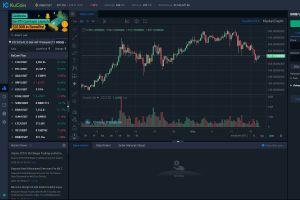
KuCoin. Another exchange well-known for its low trading fees, KuCoin is one of the most widely used cryptocurrency exchanges. The platform is very intuitive to use and beginner-friendly, which can make a lot of difference if you don’t have a lot of trading experience. On KuCoin, you can trade BNB against USDT, BTC, and KCS, the platform’s own native token. You can even trade with an unverified account, but there are significant limitations until you go through the verification process.
To learn more about KuCoin, read our full review here.
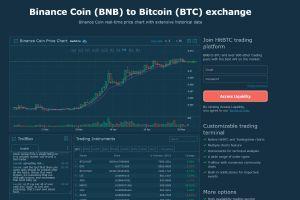
HitBTC. This exchange is more geared towards experienced traders, and even just their interface can be a little too busy for newcomers. Usually, it is best suited for trading low-cap altcoins that may not be available on other exchanges, but you can also find high-cap assets here, as BNB proves. Trading fees are meager, and you can make them even lower by verifying your account. As for buying Binance Coin, you can do that if you own BTC, ETH, or USDT.
To learn more about HitBTC, read our full review here.
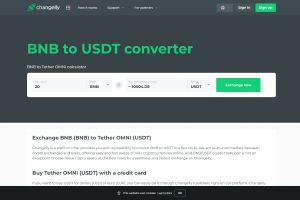
Changelly. Changelly is slightly atypical in that it is an instant exchange beneficial to those who want to purchase crypto using credit cards. You do not have to have an account, let alone go through extensive KYC procedures, and your funds are not held in a custodial wallet. They also have a great app for iOS and Android devices, meaning you can trade on the go. You can also trade this coin against more than 140 other cryptocurrencies, plus many fiat currencies. If you already have any crypto holdings, you can probably swap them for BNB here!
To learn more about Changelly, read our full review here.
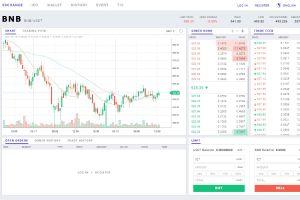
- Probit. Probit is an originally South Korean exchange that has spread globally and offers crypto-to-crypto trading (with fiat available only for South Korean residents in the form of KRW). Fees are already low, with discounts available if you’re a regular trader at the exchange. There is no forced KYC verification, which means you’re free to choose whether you want to go through with it or not. It is accessible to both newbies and veterans alike, making for an enjoyable trading experience. BNB trading is only available with USDT at this stage, however.
To learn more about Probit, read our full review here.
You can buy your BNB at any of these crypto exchanges, depending on whether you’d rather use crypto or fiat, if the exchange is available in your location, and if you need other services the platform offers beyond trading. We hope our guide helped you narrow it down and choose where you will start trading BNB to diversify your portfolio.
If you have questions or suggestions, we are always open to receiving them—click here. In the meantime, check out our other guides to learn more about crypto and blockchain in general.
